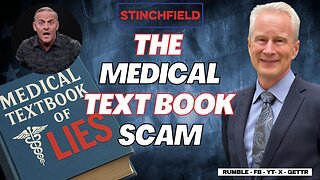Premium Only Content

IV Nutrient Therapy & "Washing Caloric Sins" Demystified
Nutrient therapy, commonly referred to as medical nutrition therapy (MNT), is a treatment approach that utilizes nutrition to manage or alleviate various health issues. It plays a crucial role in both preventing and addressing diseases. This therapy involves creating a nutrition-focused plan tailored to manage specific health conditions.
Conditions that can benefit from this therapy include diabetes, heart disease, kidney disorders, digestive issues, obesity, malnutrition, and cancer. The process of nutrition therapy encompasses evaluating an individual's nutritional status, determining their dietary needs and objectives, and formulating a personalized nutrition care plan. This plan may entail dietary modifications, counseling to encourage behavioral and lifestyle adjustments, or administering nutrients through intravenous or tube feeding.
The concepts behind these therapies trace back to the 1950s with Orthomolecular medicine and nutrition, which emphasizes a personalized analysis of the body's unique environment, similar to how a botanist studies a plant. However, many medical organizations worldwide remain hesitant to acknowledge its importance, often due to entrenched bureaucratic beliefs, insufficient funding, and the reluctance of some healthcare professionals. Additionally, confusion persists due to decades of misinformation, often propagated by large corporations with vested interests.
IV nutrient therapy, or intravenous micronutrient therapy, is a method of delivering nutrients directly into the bloodstream. It is particularly useful for treating certain conditions and for individuals who are unable to consume food or drink normally.
The use of subcutaneous (SC) and intramuscular (IM) methods for delivering nutrients, medications, and fluids is not as common in the US, even though their advantages are well-documented. These methods are more accessible and easier to manage than the more invasive intravenous (IV) approach. An IM or SC injection can remain effective for a week or longer, freeing patients from the constraints of IV pumps and enhancing their mobility. Moreover, since many nutrients, especially Vitamin C and other water-soluble vitamins, have short half-lives and are quickly depleted from the body, IV therapy may not be the best option for ongoing maintenance doses.
Despite this, many people mistakenly believe they can simply "erase" their dietary indiscretions from the week by engaging in unproven and non-targeted treatments, often only on weekends, vacations, or sporadically with monthly IV therapy sessions.
-
 LIVE
LIVE
Steven Crowder
3 hours ago🔴 Adios & Ni Hao: Trump Sends Abrego Garcia to Africa But Welcomes 600K Chinese to America
22,374 watching -
 LIVE
LIVE
The White House
3 hours agoPresident Trump Participates in a Cabinet Meeting, Aug. 26, 2025
1,566 watching -
 LIVE
LIVE
Side Scrollers Podcast
2 hours agoINSANE Illegal Migrant Propaganda Xbox Game + Paypal REFUSES To Pay Dev + More | Side Scrollers
226 watching -
 LIVE
LIVE
JuicyJohns
4 hours ago $1.35 earned🟢#1 REBIRTH PLAYER 10.2+ KD🟢
128 watching -
 LIVE
LIVE
The Mel K Show
1 hour agoMORNINGS WITH MEL K - The Future of the Constitutional Republic: Local Action for National Impact 8-26-25
707 watching -
 LIVE
LIVE
The Shannon Joy Show
2 hours ago🔥🔥TACO Trump Rug Pulls AGAIN - Deploying His Fascist Police State In Red States NOT Blue.🔥🔥
219 watching -
 LIVE
LIVE
Grant Stinchfield
1 hour agoBig Pharma’s Dirty Secret: It Writes the Medical School Curriculum
106 watching -
 1:10:58
1:10:58
vivafrei
3 hours agoBanning the Burning of the Flag? Raja Jackson Assault & Some Insanely Stupid Takes! NYC Chems & MORE
29.1K25 -
 LIVE
LIVE
LFA TV
6 hours agoLFA TV ALL DAY STREAM - TUESDAY 8/26/25
4,732 watching -
 27:39
27:39
Crypto.com
3 hours ago2025 Live AMA with Kris Marszalek, Co-Founder & CEO of Crypto.com
39.7K3